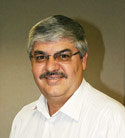October 2011
About a week before the 2010 World Cup soccer teams and fans arrived in South Africa, a very striking advertisement was showed on television, of a young woman from South Africa who made the announcement: “Ke nako!” The waiting is over, the time has come. With regard to agriculture, I am there now.
I feel like a wildebeest (gnu) on the Serengeti plains of Africa, that is not driven by logic, discussions and meetings, but purely by instinct that deep inside you say: “It is time!” The time has come for agriculture to unite and move forward. The grazing around us has begun to turn grey and the green patches are becoming less and less. Somewhere ahead is greener pastures. There is a restless milling of wildebeest, nobody is going around dishing out flyers, sending e-mails or commenting on Facebook; it is just the knowledge among a group of leaders who knows that the time for action has arrived.
Between where we are now and unity in agriculture, lies the river. It is not the Limpopo either. This river runs deep and strong and it is full of crocodiles – hungry crocodiles. The fact is that death awaits every wildebeest that does not join the trek, but there are also those that will be killed and eaten by the crocodiles or those that will drown. Someone, however, must make the first move and jump into the unknown waters. I have jumped!
Those were my emotions during a meeting of a number of agricultural leaders recently in Stellenbosch where unity in agriculture was discussed. Do we have unity? No, but one thing is clear for everyone, if we do not stand together and begin to mobilise, agriculture will perish. Some spoke from experience of previous times when they also had to cross rivers; others dream about the returns of food security and job creation and enough for all to eat in South Africa. Others once again talk about the crocodiles and show their scars of previous migrations.
If, however, we are going to wait indefinitely on one or the other miracle, it could probably become too late. Our policy environment is not improving and neither is service delivery to this sector. We are tired of making plans and developing strategies that are never implemented. Our plans are good, but our actions are not enough. We do, however, know what the right things to do are. The time has come for us to put shoulder to the wheel and to begin implementing the plans.
Grain SA’s strategic goals are clear: sustainable food production so that producers may profit and that everyone in the country has enough to eat.
Recently I have given a lot of thought to my emotions and all the uncertainties at the time in 1997 when we decided to close down the Control Boards. Agriculture is once again at a similar river which has to be crossed. There are a lot of uncertainties, but one thing is assured: We must forge ahead.
Leadership is not for the weak. Leadership also does not mean that you are not afraid. Leadership means that you can visualise the bigger picture of the future clearer than the focus on the fear of the present.

Jannie de Villiers, CEO
Publication: October 2011
Section: Editorial